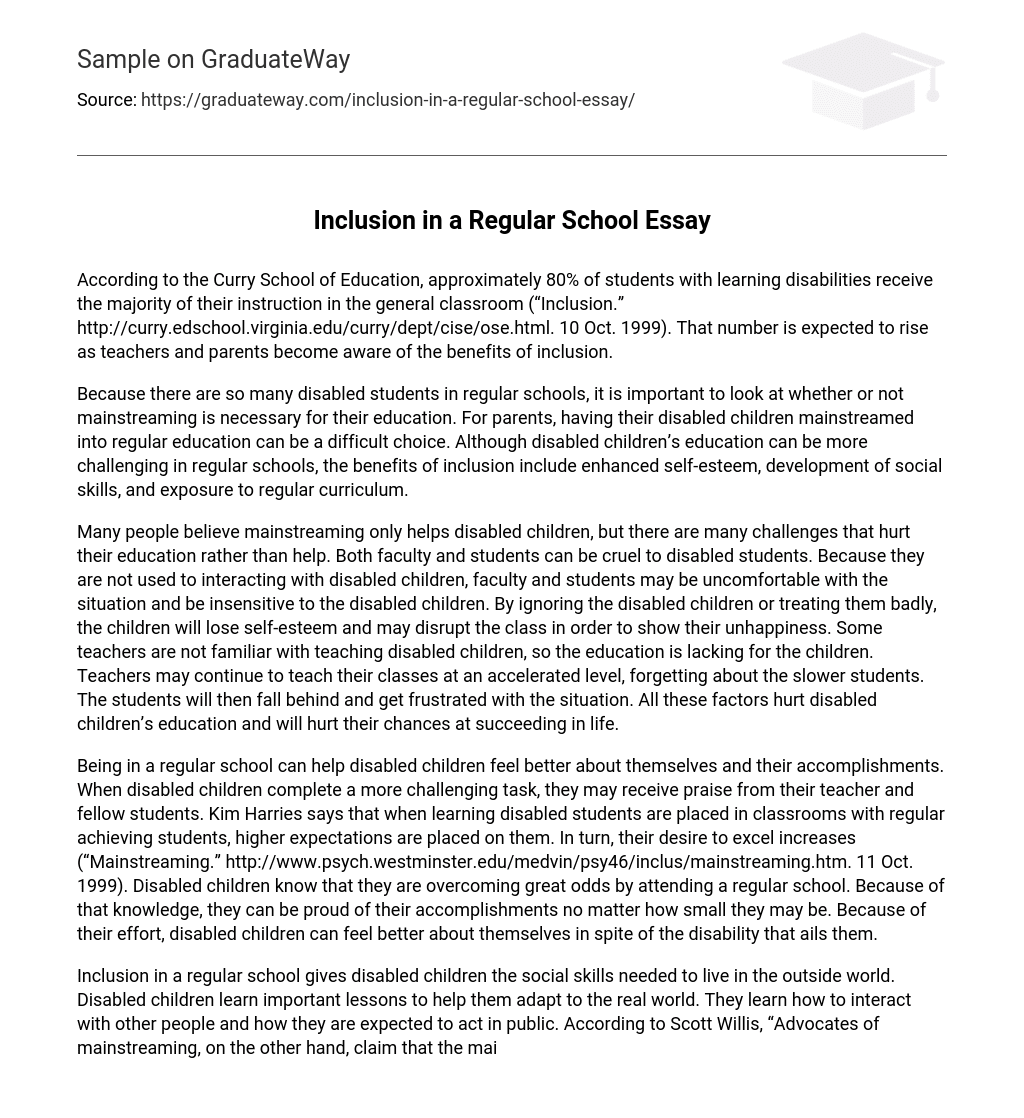The Curry School of Education reports that approximately 80% of students with learning disabilities are taught primarily in general classrooms. This data can be accessed on the “Inclusion” website (http://curry.edschool.virginia.edu/curry/dept/cise/ose.html) as of October 10, 1999. The school predicts that this percentage will rise as teachers and parents become more aware of the benefits of inclusion.
Assessing the necessity of mainstreaming for disabled students in regular schools is crucial due to their high number. The decision to integrate disabled children into regular education can be challenging for parents. Despite potential difficulties, inclusion offers advantages such as boosted self-esteem, advancement in social skills, and exposure to standard curriculum.
Despite the widely held belief that mainstreaming is beneficial for disabled children, it actually presents challenges that hinder their education. Both faculty and students may display cruelty towards disabled students due to unfamiliarity with interacting with them, resulting in insensitivity. This mistreatment causes diminished self-esteem for the disabled children and leads to disruptive behavior as a means of expressing their unhappiness. Furthermore, some teachers lack sufficient training in educating disabled children, which results in subpar education quality. These educators may prioritize teaching at an accelerated pace while neglecting slower learners who consequently fall behind and become frustrated. All these factors have a negative impact on the education of disabled children and ultimately impede their prospects for success in life.
According to Kim Harries, when disabled children attend a regular school, it can have positive effects on them. It boosts their self-esteem and sense of accomplishment when they overcome more challenging tasks. Both their teacher and peers may praise them for their achievements. Placing students with learning disabilities in classrooms alongside their mainstream peers leads to higher expectations, encouraging these students to strive for excellence, as stated by Harries (source: “Mainstreaming.” http://www.psych.westminster.edu/medvin/psy46/inclus/mainstreaming.htm. 11 Oct. 1999). Despite the challenges they face due to their disabilities, these children view attending a regular school as an impressive achievement that allows them to take pride in even the smallest accomplishments. Their determination and effort contribute to an enhanced sense of self-worth.
According to Scott Willis, including disabled children in regular schools helps them develop the necessary social skills to navigate the outside world (“Inclusion Gains Ground.” Education Update. Dec. 1995: 1-8). These children learn how to interact with others and understand societal expectations. The mainstreaming of disabled students is believed by advocates to improve their socialization skills. Moreover, being in a regular school allows disabled children to gain real-life experiences by interacting with their non-disabled peers. This exposure helps them develop resilience and face everyday challenges that may come their way. Ultimately, enabling disabled children to deal with and learn from everyday problems now prepares them for a world that may not always be kind.
Immersion in regular curriculum provides disabled children with the opportunity to test their abilities and discover their areas of excellence. Once they identify their talent, they can leverage it in their future aspirations. This allows disabled children to challenge their minds and experience mental growth, leading to improved learning capabilities and educational advancement. Immersion also ensures that disabled children can keep up in classes they are mentally capable of, even if they face disabilities in specific areas of the curriculum. By providing disabled children with the opportunities they deserve, their mental and physical abilities can improve, therefore enhancing their overall education.
Inclusion of learning disabled children in regular schools can be challenging, but it can also contribute to their self-esteem, social skills development, and exposure to regular curriculum. Incorporating disabled individuals in educational environments can prepare others to navigate a world that includes people with handicaps. Jennifer Pinland, a speech pathologist specializing in disabled children, emphasizes the importance of providing necessary support to avoid subjecting handicapped individuals to ridicule and lifelong defeat within the school system.





